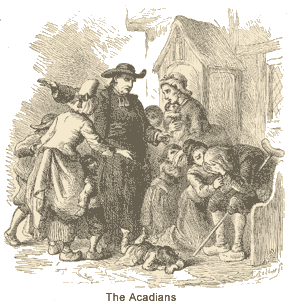Under the terms of the Treaty of Utrecht (1713), the British had gained control of the Atlantic maritime peninsula of Nova Scotia, the home to thousands of French-speaking farmers and fishermen. The locals referred to themselves as Acadiens, in English, Acadians, and to their homeland as Acadie.
 From the beginning of the war the British officials harbored doubts about the Acadians’ loyalties and settled upon a policy of forced relocation for those unwilling to take an oath of loyalty to the British crown and renounce Catholicism. Families were uprooted, husbands were sometimes separated from wives and the bulk of their personal property was destroyed or left behind. Transport ships filled with the Acadians sailed for the 13 colonies to the south, the West Indies and even to France to discharge their cargoes.
One group of Acadian refugees settled in Louisiana, an area with a strong French influence and a Roman Catholic majority. These newcomers became known as the “Cajuns,” a corruption of the French word Acadiens.
This event was memorialized in the Henry Wadsworth Longfellow poem, Evangeline.
From the beginning of the war the British officials harbored doubts about the Acadians’ loyalties and settled upon a policy of forced relocation for those unwilling to take an oath of loyalty to the British crown and renounce Catholicism. Families were uprooted, husbands were sometimes separated from wives and the bulk of their personal property was destroyed or left behind. Transport ships filled with the Acadians sailed for the 13 colonies to the south, the West Indies and even to France to discharge their cargoes.
One group of Acadian refugees settled in Louisiana, an area with a strong French influence and a Roman Catholic majority. These newcomers became known as the “Cajuns,” a corruption of the French word Acadiens.
This event was memorialized in the Henry Wadsworth Longfellow poem, Evangeline.